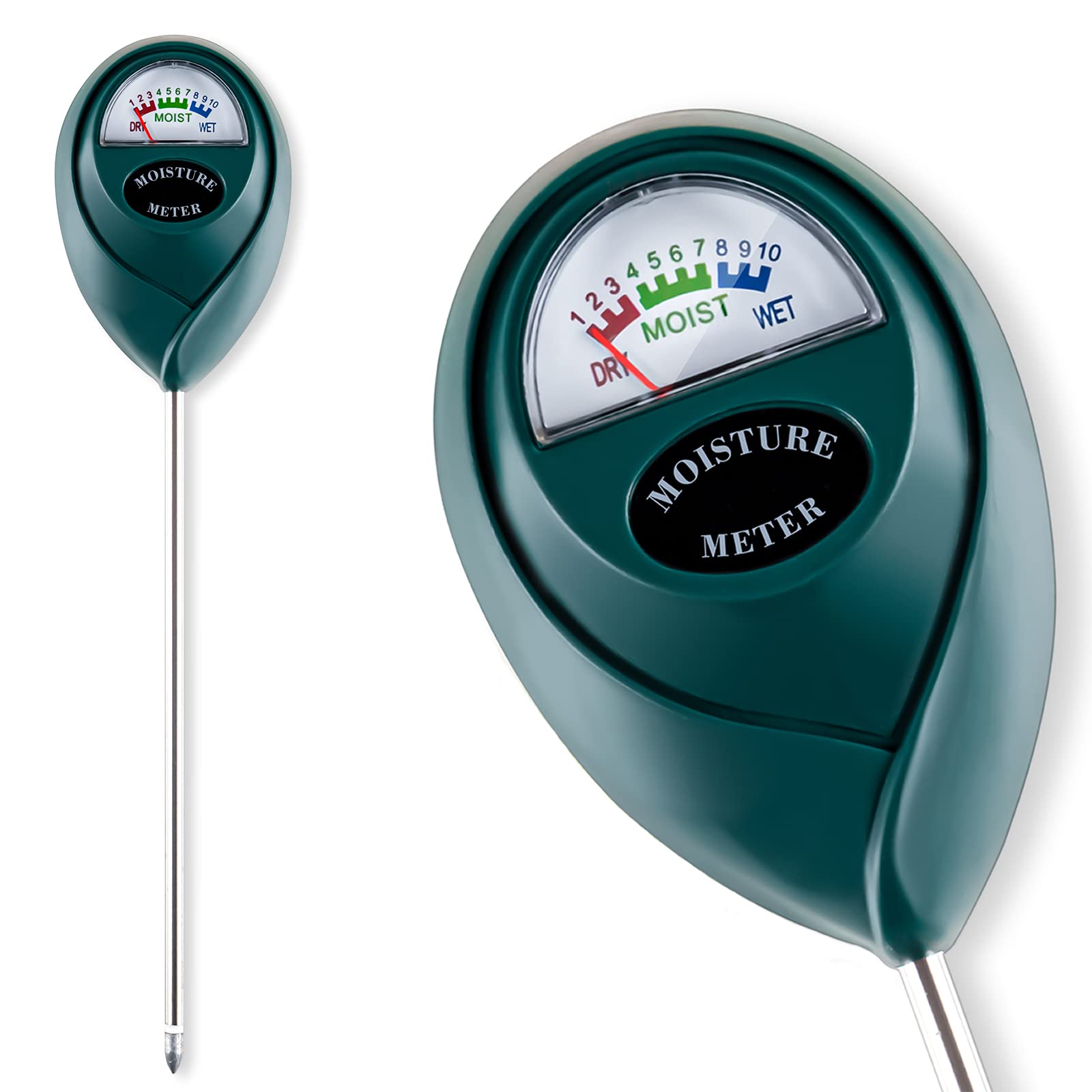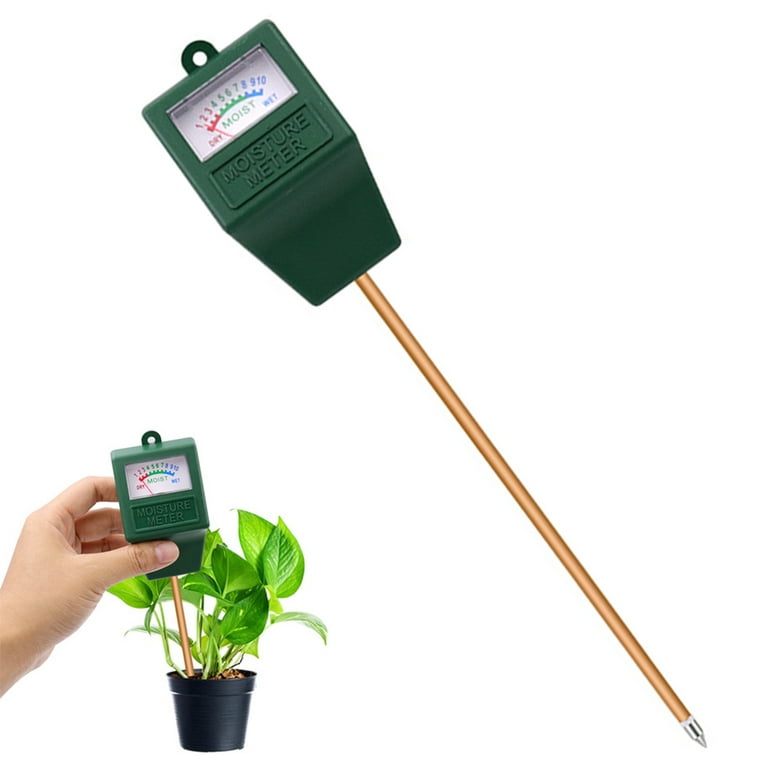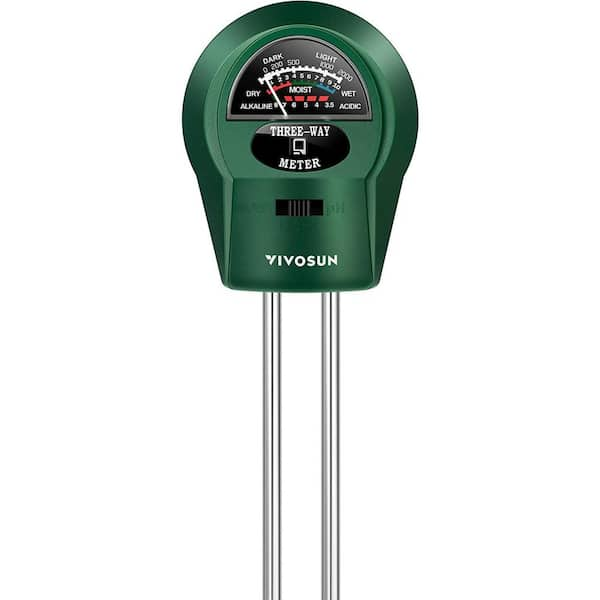Moisture Metre for Plants

Moisture Metre for Plants a moisture meter for plants measures the level of water in the soil to help determine when to water. It is a useful tool for preventing over or under-watering.
Ensuring the optimal moisture level for your plants is crucial for their health and growth. A moisture meter provides an easy and accurate way to monitor soil moisture, allowing you to adjust your watering schedule accordingly. By using a moisture meter, you can prevent water-related issues such as root rot and dehydration, leading to healthier and more vibrant plants.
Whether you are a novice or experienced gardener, this handy device can help you maintain an ideal environment for your beloved plants. In this blog, we will explore the benefits and usage of moisture meters for plants, helping you make informed decisions about your gardening practices.
Introduction To Moisture Meters For Plants
The Importance Of Proper Watering
Proper watering is crucial for the health and vitality of plants. Overwatering can lead to root rot and other issues, while underwatering can cause wilting and stunted growth. Finding the right balance is key to thriving plants.
How Moisture Meters Help In Plant Care
Moisture meters are essential tools for plant care. They provide accurate readings of the soil’s moisture levels, enabling precise watering. By avoiding guesswork, moisture meters help ensure that plants receive the optimal amount of water, promoting healthy growth and vibrant blooms.
Types Of Moisture Meters
Discover different types of moisture meters designed specifically for plants, such as soil moisture meters and leaf moisture meters. These tools help gauge the hydration levels of plants accurately, enabling optimal care for healthier growth.
Moisture meters come in various types to cater to different needs.
Analog Vs. Digital Meters
Analog meters are traditional, while digital meters offer precise readings.
Probes, Hygrometers, And Tensiometers
Probes are versatile, hygrometers measure humidity, and tensiometers monitor soil tension.
How Moisture Meters Work
Moisture meters are invaluable tools for maintaining the health and vitality of plants. Understanding how moisture meters work is essential for utilizing them effectively. These devices employ innovative technology to accurately measure the moisture content of soil, helping gardeners and farmers determine the optimal watering schedule for their plants.
Understanding The Technology Behind Moisture Detection
Moisture meters typically operate using electrical conductivity or capacitance technology. Electrical conductivity meters measure the soil’s ability to conduct an electrical current, which varies based on the moisture content. On the other hand, capacitance meters determine soil moisture by assessing the dielectric constant, which changes with varying moisture levels. Both technologies provide accurate readings, enabling users to gauge the soil’s moisture content with precision.
Calibration And Accuracy Considerations
Calibration is a crucial aspect of ensuring the accuracy of moisture meters. Proper calibration accounts for factors such as soil composition and temperature, which can impact the device’s readings. Additionally, regular calibration helps maintain the accuracy of the meter over time, ensuring consistent and reliable results. When using a moisture meter, it’s essential to follow the manufacturer’s guidelines for calibration to optimize its performance and accuracy.
Benefits Of Using A Moisture Meter
Discover the advantages of using a moisture meter for plants. Ensure optimal hydration levels, prevent overwatering, and promote healthy growth effortlessly with this essential gardening tool. Achieve thriving and vibrant plants with precise moisture measurement for your indoor or outdoor garden.
If you are a plant lover, you know how important it is to keep your plants hydrated. Overwatering or underwatering can be detrimental to the health of your plants. This is where a moisture meter comes in handy. A moisture meter is a tool that measures the moisture content in the soil. It helps you determine whether your plants need watering or not. Here are some benefits of using a moisture meter.
Preventing Overwatering
Overwatering is one of the common mistakes that plant owners make. It can lead to root rot, which can be fatal to your plants. A moisture meter helps you prevent overwatering by indicating the moisture level in the soil. If the soil is already moist, you know that you don’t need to water your plants yet. This can save you time, money, and effort in the long run.
Promoting Root Health And Growth
The root system is the most important part of the plant. It absorbs water and nutrients from the soil, which are essential for the plant’s growth. If the soil is too dry or too wet, it can damage the roots and stunt the plant’s growth. A moisture meter helps you maintain the right moisture level in the soil, which promotes healthy root growth. This, in turn, leads to healthier and more robust plants. In conclusion, a moisture meter is a valuable tool for any plant owner. It helps you maintain the right moisture level in the soil, which prevents overwatering and underwatering. It also promotes healthy root growth, which leads to healthier and more robust plants. If you want to keep your plants healthy and thriving, invest in a good quality moisture meter.
Choosing The Right Moisture Meter
When it comes to gardening, monitoring the moisture level of your plants is essential. Overwatering or underwatering can lead to plant stress, root rot, and ultimately, plant death. A moisture meter can help you determine when it’s time to water your plants, but with so many options on the market, it can be challenging to choose the right one. In this section, we’ll discuss the factors to consider when buying a moisture meter and highlight some of the top-rated options available.
Factors To Consider When Buying
Before you purchase a moisture meter, there are a few key factors to consider:
- Type: There are two main types of moisture meters: analog and digital. Analog meters use a probe to measure moisture levels and display the results on a dial. Digital meters use electronic sensors and display the results on an LCD screen.
- Accuracy: Look for a meter with a high level of accuracy. This will ensure that you’re getting reliable readings.
- Range: Make sure the meter you choose has a range that’s suitable for the types of plants you’re growing. Some meters are designed for specific plants, such as succulents or orchids.
- Price: Moisture meters range in price from under $10 to over $100. Consider your budget and how often you’ll be using the meter when making your decision.
Top-rated Moisture Meters On The Market
Here are some of the top-rated moisture meters on the market:
| Product | Type | Accuracy | Range | Price |
|---|---|---|---|---|
| XLUX T10 Soil Moisture Meter | Digital | ±2% | 1-10 | $9.99 |
| Dr.meter S10 Soil Moisture Meter | Digital | ±2% | 1-10 | $15.99 |
| REOTEMP Garden and Compost Moisture Meter | Analog | N/A | 0-10 | $29.99 |
| Atree Soil Moisture Meter | Digital | ±1% | 1-10 | $14.99 |
These moisture meters have been well-reviewed by gardeners and are known for their accuracy and ease of use. Choose the meter that best fits your needs and budget, and you’ll be on your way to healthier, happier plants.

Using Your Moisture Meter Effectively
Moisture meters are indispensable tools for plant enthusiasts, providing accurate insight into the hydration levels of soil. Using your moisture meter effectively can help you maintain optimal growing conditions for your plants. By following a step-by-step guide and implementing essential tips for maintenance, you can ensure the reliability and longevity of your moisture meter.
Step-by-step Guide To Using A Moisture Meter
Proper utilization of a moisture meter is crucial for obtaining accurate readings. Follow these steps for effective use:
- Insert the probe of the moisture meter into the soil, ensuring it reaches the root level.
- Wait for the meter to stabilize and record the moisture level displayed on the screen.
- Repeat the process in multiple locations within the same pot to gauge overall soil moisture.
- Refer to the recommended moisture range for your specific plant species to determine if watering is necessary.
Tips For Maintaining Your Moisture Meter
Regular maintenance is essential to keep your moisture meter in optimal working condition. Consider the following tips:
- Keep the probe clean and free from debris to ensure accurate readings.
- Store the moisture meter in a dry and safe location when not in use to prevent damage.
- Calibrate the meter as per the manufacturer’s instructions to maintain accuracy.
- Replace the batteries as needed to prevent malfunctions during usage.
Common Mistakes To Avoid
When using a moisture meter for plants, avoid the common mistake of only checking the surface soil. It’s important to insert the probe to the root level for an accurate reading. Additionally, don’t forget to wipe the probe clean after each use to prevent cross-contamination between plants.
Misreading The Data
Interpreting moisture meter readings incorrectly can lead to improper watering.
Always refer to the instruction manual to understand the meter readings accurately.
Neglecting Meter Calibration And Maintenance
For accurate results, calibrate your moisture meter regularly as per the manufacturer’s guidelines.
Regular maintenance ensures the device functions optimally and provides precise readings.

Advanced Tips For Expert Gardeners
Integrating Moisture Level Data With Other Plant Care Practices
Integrating moisture level data with other plant care practices is crucial for expert gardeners. By combining moisture readings with factors like sunlight exposure and soil type, gardeners can gain a comprehensive understanding of their plants’ needs.
Customizing Watering Schedules Based On Readings
Customizing watering schedules based on readings is a key practice for expert gardeners. By analyzing moisture metre data, gardeners can tailor watering regimens to each plant’s specific requirements, promoting optimal growth and health.

Frequently Asked Questions
Do Moisture Meters For Plants Work?
Yes, moisture meters for plants work by measuring the level of water in the soil. They provide accurate information to help you determine when to water your plants.
What Is The Most Accurate Moisture Meter For Plants?
The most accurate moisture meter for plants is the digital type, providing precise readings quickly.
What Moisture Level Should Plants Be?
Plants thrive best with soil moisture levels consistent with their specific needs. It’s essential to research individual plant requirements for optimal growth.
How Accurate Are Soil Moisture Metres?
Soil moisture meters are generally accurate, providing real-time data for efficient irrigation and plant care. Regular calibration ensures precise readings.
Conclusion
Incorporating a moisture meter for your plants simplifies watering needs, ensuring optimal growth. Remember, overwatering can be detrimental. By using this tool, you can accurately monitor soil moisture levels, promoting healthier, thriving plants. Invest in a moisture meter today and watch your plants flourish effortlessly.







